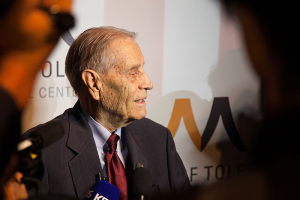One of Japan's most internationally recognized companies, Mitsubishi Materials, has issued a landmark apology on Sunday to American prisoners-of-war who were forced to work in mines controlled by the company during World War II.
According to a report from BBC News, representatives from Mitsubishi, in particular senior executive Hikaru Kimura, presented their apology to the few surviving US prisoners forced to work in Japan. One of those POWs was 94-year-old James Murphy, who waited for seven decades to get an apology from Mitsubishi.
"For 70 years we wanted this," Murphy said. "I listened very carefully to Mr. Kimura's statement of apology and found it very, very sincere, humble and revealing. We hope that we can go ahead now and have a better understanding, a better friendship and closer ties with our ally, Japan."
BBC News reported that relatives of other former prisoners witnessed the ceremony, which was held at the Simon Wiesenthal Center in Los Angeles. Although the Japanese government already issued a formal apology to American POWs, it is the first time any Japanese company has independently issued an apology for the events of WWII.
"We hope this will spur other companies to join in and do the same," said Rabbi Abraham Cooper, associate dean at the Simon Wiesenthal Center.
According to the BBC, the Japanese pushed about 500 American POWs into slave labor in the mines alongside thousands of British, Philippine, Korean and Chinese prisoners. Four of those mines were operated by Mitsubishi's predecessor company, Mitsubishi Mining Co.
"Only two living survivors could be located to accept the apology, and, only Mr. Murphy was fit enough to make the trip to Los Angeles," BBC News wrote, citing local media.
Murphy described to the media that the experience as a slave in a copper mine near Hanawa was "a complete horror."
"It was slavery in every way: no food, no medicine, no clothing, no sanitation," Murphy said, adding that he was appalled Mitsubishi built fighter aircraft used against U.S. forces.
According to the BBC, Murphy forgave his captors. However, he was seeking for an apology for his ordeal, describing it as "a big deal."
Will Ripley of CNN reported that Mitsubishi did not offer financial compensation for forced labor, although the company has faced lawsuits in South Korea and China. American POWs were not allowed to sue for compensation thanks to the 1951 Treaty of San Francisco, a peace treaty which officially ended World War II.
"Here we are in the 21st century. It's time for Japan to help its victims turn the page on the past. And in order to do that, Japan must squarely face its history," said Jeff Kingston, Director of Asian Studies at Japan's Temple University.
Kingston added that the apology should have come from Mitsubishi "decades ago," noting that POWs in Japan experienced "a horrific nightmare."
"This is an issue that hasn't gone away for Japan," Kingston said.

















